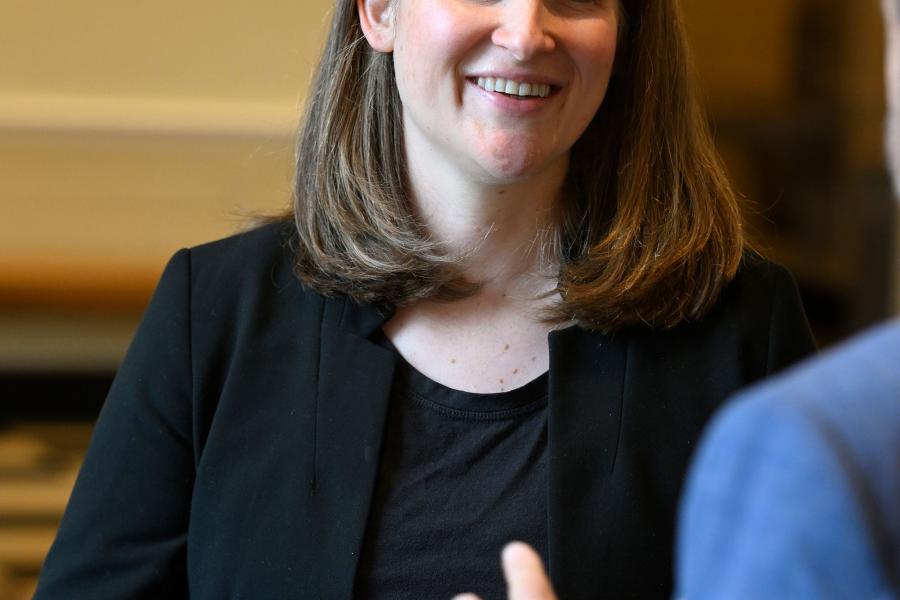Early evening in a basement classroom, biostatistician Stephanie Hicks stands at a podium, aglow by the light of her laptop, parsing the intricacies of a computer programming language known simply as R. Specifically, she walks the 20 or so attendees through the meaning of something called a tibble, available in something called the Tidyverse. "A tibble is a data frame … that adheres to all of the Tidyverse principles," Hicks says.
Her audience nods and follows along, clicking and clacking on their keyboards as they wield the free, open-source data analysis and visualization software used widely by statisticians. "If you print a data frame to a screen, R will print the whole thing, even if it has 1 million rows," Hicks continues. "Tibble doesn't do that. It says, 'Ah, OK, you probably don't want to see 1 million rows,' and it gives you a nice representation of the data under the hood."
Hicks and her audience, members of R-Ladies Baltimore, are knee-deep in the weeds of an hourlong session on how to wrangle data (and lots of it) in R.
"Genomics data is notoriously messy and unstructured, and data wrangling involves cleaning up and ensuring the quality of the raw data so it can be used for analytical purposes," explains Hicks, an associate professor of biostatistics at the Johns Hopkins Bloomberg School of Public Health and Whiting School of Engineering.
This evening, though, she's not dissecting DNA sequences. She's helping members of R-Ladies Baltimore, the group she co-founded in 2018 as a chapter of R-Ladies Global to promote gender diversity in the R community by giving women and other minorities a supportive space to collaborate and hone skills. Women continue to lag in STEM careers in general, making up just 28% of the science, technology, engineering, and math workforce worldwide. But the gender gap is widest in math-intensive fields like engineering, computer science, data science, and artificial intelligence. In the U.S., for instance, women account for only 20% of computer science majors, despite representing roughly 60% of undergraduates nationwide. "There's still work to do to narrow the STEM gender gap and bring a broader range of people to these fields," Hicks says.
Research shows that girls perform as well as boys in math and science in school, but myths of boys being intrinsically better at these subjects lead to biases that can deter girls from STEM. Not Hicks. A math major at Louisiana State University, Hicks didn't learn to code until graduate school at Rice University, "later in life than most of my peers," she says. Every now and then, she experiences impostor syndrome, she adds. Margaret Taub, a co-organizer of R-Ladies Baltimore and an associate scientist in the Department of Biostatistics at the Bloomberg School, relates. "A lot of women still experience impostor syndrome in these spaces, where they feel like because they didn't grow up playing video games and programming, they don't have the same level of knowledge or experience as some of their male counterparts," she says.
Meetup groups for computer coders can be intimidating, leading plenty of "smart, capable women to drop out if they think they don't fit," Taub adds.
"Women need to feel comfortable asking questions without anyone saying, 'Oh, you should know that already,'" says Alyssa Columbus, a co-organizer of R-Ladies Baltimore and biostatistics doctoral student in the Bloomberg School, who worked previously as a data scientist and information security analyst at Deloitte.
Today, R-Ladies Baltimore boasts more than 1,300 members and is one of 219 R-Ladies chapters in 23 countries. Hicks and her group meet monthly, sometimes in person but mostly virtually because "it's more convenient for busy women to participate, and we've been able to acquire members and host speakers not just from Baltimore but India, Mexico, countries in Africa—all over the world," Taub says.
R-Ladies members include a mix of students, professors, industry professionals, and career-changers—some with little or no programming experience and others with doctorates in statistics. "One of my favorite stories is of a woman who spent 10 years at home with her kids and joined R-Ladies to revamp her skills and reenter the job market," says Gabriela de Queiroz, who founded R-Ladies in 2012 and now runs R-Ladies Global, in addition to working as the director of AI for Microsoft for Startups. "She got an internship, she got hired, and now she's flourishing as a data scientist."
A tenet of R-Ladies Baltimore is to welcome everyone—and give women and minorities the mentorship and role models they need to succeed. It's just a matter of setting up the culture to make it happen.
Posted in Science+Technology








